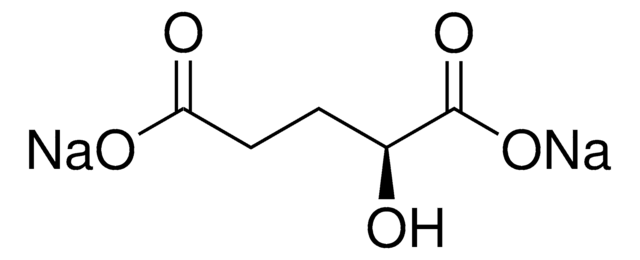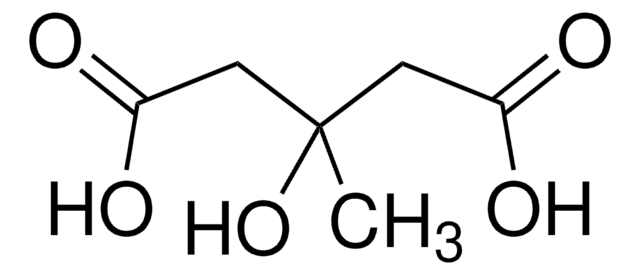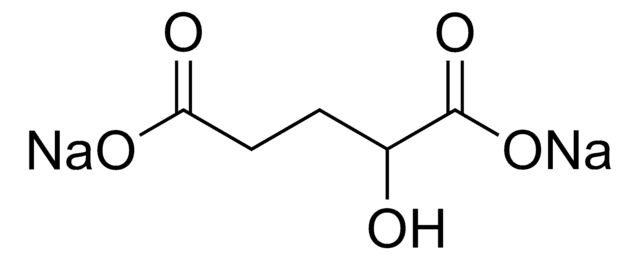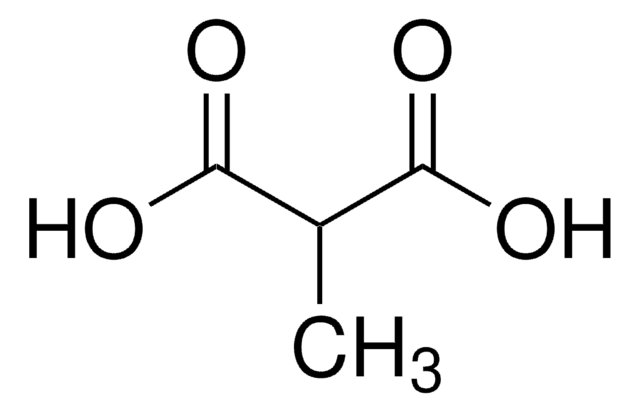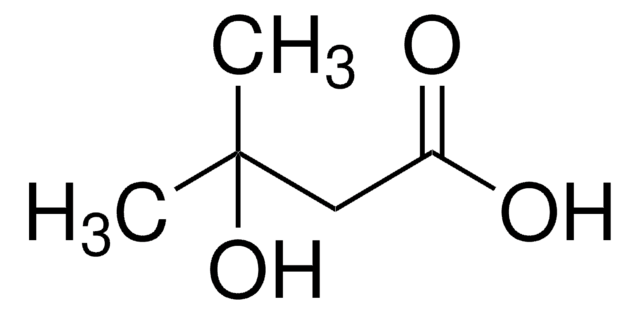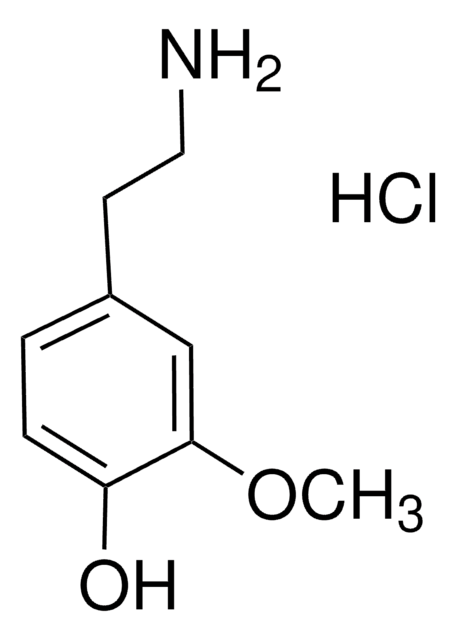04725
3-Hydroxyglutarsäure
analytical standard
Synonym(e):
β-Hydroxyglutarsäure, 3-Hydroxypentandisäure
Anmeldenzur Ansicht organisationsspezifischer und vertraglich vereinbarter Preise
Alle Fotos(1)
About This Item
Empirische Formel (Hill-System):
C5H8O5
CAS-Nummer:
Molekulargewicht:
148.11
Beilstein:
1705476
MDL-Nummer:
UNSPSC-Code:
12352106
PubChem Substanz-ID:
NACRES:
NA.24
Empfohlene Produkte
Qualität
analytical standard
Qualitätsniveau
Assay
≥95.0% (GC)
Haltbarkeit
limited shelf life, expiry date on the label
Anwendung(en)
clinical testing
Format
neat
Lagertemp.
2-8°C
InChI
1S/C5H8O5/c6-3(1-4(7)8)2-5(9)10/h3,6H,1-2H2,(H,7,8)(H,9,10)
InChIKey
ZQHYXNSQOIDNTL-UHFFFAOYSA-N
Suchen Sie nach ähnlichen Produkten? Aufrufen Leitfaden zum Produktvergleich
Biochem./physiol. Wirkung
3-Hydroxyglutaric acid is a glutaric acid derivative which is the byproduct of glutaric acidemia type I. Glutaric aciduria type I (glutaryl-CoA dehydrogenase deficiency) is an inborn error of metabolism that usually manifests in infancy by an acute encephalopathic crisis and often results in permanent motor handicap. Studies indicate that 3-hydroxyglutaric acid can be used as biomarker for GCDH (glutaryl-CoA dehydrogenase) deficiency. It is believed that the excretion of 3-hydroxyglutaric acid is increased during ketosis, which occurs during glutaryl-CoA dehydrogenase deficiency. Studies on striatal cultures show that IGF-1 and FGF-2 (bFGF) reduces 3-hydroxyglutaric acid toxicity in striatal neurons.
Empfohlene Produkte
Find a digital Reference Material for this product available on our online platform ChemisTwin® for NMR. You can use this digital equivalent on ChemisTwin® for your sample identity confirmation and compound quantification (with digital external standard). An NMR spectrum of this substance can be viewed and an online comparison against your sample can be performed with a few mouseclicks. Learn more here and start your free trial.
Lagerklassenschlüssel
11 - Combustible Solids
WGK
WGK 3
Hier finden Sie alle aktuellen Versionen:
Besitzen Sie dieses Produkt bereits?
In der Dokumentenbibliothek finden Sie die Dokumentation zu den Produkten, die Sie kürzlich erworben haben.
K B Bjugstad et al.
Journal of inherited metabolic disease, 24(6), 631-647 (2002-01-05)
Glutaric acid (GA) and 3-hydroxyglutaric acid (3GA) are thought to contribute to the degeneration of the caudate and putamen that is seen in some children with glutaric acidaemia type I, a metabolic disorder caused by a glutaryl-CoA dehydrogenase deficiency. This
Garfield A Simon et al.
Journal of chromatography. B, Analytical technologies in the biomedical and life sciences, 1097-1098, 101-110 (2018-09-16)
Glutaric aciduria type 1, a deficiency of glutaryl-CoA dehydrogenase, causes an accumulation of neurotoxic metabolites glutaric acid and 3-hydroxyglutaric acid (3-HGA). Testing of these analytes is routinely done by GC-MS but seldom account for interference from isomers or compounds with
Paris Jafari et al.
PloS one, 8(1), e53735-e53735 (2013-01-18)
Glutaric aciduria type I (glutaryl-CoA dehydrogenase deficiency) is an inborn error of metabolism that usually manifests in infancy by an acute encephalopathic crisis and often results in permanent motor handicap. Biochemical hallmarks of this disease are elevated levels of glutarate
Gustavo C Ferreira et al.
International journal of developmental neuroscience : the official journal of the International Society for Developmental Neuroscience, 25(6), 391-398 (2007-07-24)
Glutaric acidemia type I is an inherited metabolic disorder caused by a severe deficiency of the mitochondrial glutaryl-CoA dehydrogenase activity leading to accumulation of predominantly glutaric and 3-hydroxyglutaric acids in the brain tissue of the affected patients. Considering that a
J Pitt et al.
Journal of inherited metabolic disease, 25(2), 83-88 (2002-07-18)
Three patients with ketosis had increased excretion of 3-hydroxyglutarate (21.8-37.9 micromol/mmol creatinine; controls 2.3 +/- 1.6), an indicator of glutaryl-CoA dehydrogenase deficiency (GDHD), which normalized when the patients were nonketotic. Clinical assessment of all three patients and enzyme studies in
Unser Team von Wissenschaftlern verfügt über Erfahrung in allen Forschungsbereichen einschließlich Life Science, Materialwissenschaften, chemischer Synthese, Chromatographie, Analytik und vielen mehr..
Setzen Sie sich mit dem technischen Dienst in Verbindung.